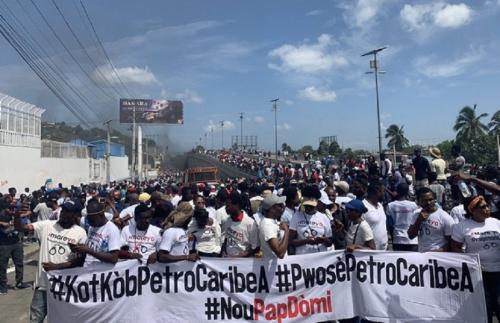The three-pointed cross that weighs on Haiti
- Opinión

At the head of a protest march against the president of Haiti last week, a demonstrator carried a large wooden cross bearing the flags of Canada, France and the United States, the three nations that the demonstrators identify as underpinnings of support for President Jovenel Moise’s regime, in recognition of his role in the 2004 coup.
Almost completely ignored by the mainstream media, the Haitian people are constantly criticizing the Canadian government for this unobjective stance on their country’s political reality. Repeatedly, since Jean-Bertrand Aristide’s government was overthrown in 2004, demonstrators have carried posters reproaching Canadian policy or have gathered in front of the Canadian Embassy in Port-au-Prince. The newspapers Haiti Progrès and Haiti Liberté of the Caribbean nation describe Canada as an “occupying force,” a “coup supporter” or simply an “imperialist” nation.
During months of popular protests, Canada continues to be hostile to the demonstrators, who represent the majority of an impoverished population. A recent investigation by the Haitian High Court of Accounts looking into corruption and administrative disputes has revived the popular movement fighting for the overthrow of Haiti’s “Canadian-backed” president.
In the current year, there have been numerous protests – including a week-long general strike in February – demanding accountability of public officials. It is alleged that the main reason Moise remains in power is that he has the support of the Core Group of Friends of Haiti, made up of the ambassadors of Canada, USA, France, Brazil, and Germany, as well as representatives of Spain, the European Union, and the discredited OAS.
The Core Group had issued a brief statement of support for Moise calling for “a broad national discussion, without preconditions,” which was the position that Canadian officials had repeatedly expressed in recent weeks. The opposition had rejected such a negotiation with Moise on the grounds that it would amount to abandoning protests to negotiate with a corrupt and illegitimate president that few Haitians supported.
Another indication of the Core Group’s political orientation has been its May 30 statement “condemning acts of degradation committed against the Senate,” referring to a group of opposition senators earlier that day removing some furniture and placing it on the lawn of Parliament in order to block the ratification of the interim prime minister. Canada’s ambassador, André Frenette, for his part, tweeted that “Canada condemns acts of vandalism in the Senate… because they go against democratic principles”.
But it was noted that Frenette and the Core Group had not tweeted or published any statement against the recent murder of journalist Pétion Rospide, who had been reporting on police corruption and violence. Nor did they refer to the outcome of the commission that held President Moise responsible for the theft of public funds as well as the recent UN report confirming the country’s government’s involvement in a terrible massacre that took place in Port-au-Prince’s La Saline neighborhood in mid-November.
Recent statements by the Canadian government and the Core Group completely ignore arguments about Moise’s electoral illegitimacy and minimize the magnitude of corruption and violence against demonstrators.
Worse still, it is argued that Canadian officials promoted and often applauded the police forces responsible for many abuses. To the delight of the country’s most class-conscious elite, Ottawa had taken the lead in strengthening the repressive arm of the Haitian state following the expulsion of former President Aristide.
An RCMP officer heads the police component of the 1,200-strong United Nations Mission for Justice in Haiti (MINUJUSTH). At the end of May, Canada’s ambassador to the UN, Marc-André Blanchard, led a delegation from the United Nations Economic and Social Council in Haiti. On his return to New York, he proposed creating a “robust” mission to continue the work of MINUJUSTH after its scheduled conclusion in October. Canadian officials lead the campaign to extend the 15-year United Nations occupation that took over the troops of the United States, France and Canada that overthrew the Aristide government and, among other horrors, were responsible for the introduction of cholera into Haiti, which has killed more than a million people from the glorious but suffering Caribbean country.
- Manuel E. Yepe http://manuelyepe.wordpress.com/
Translated and edited by Walter Lippmann.
Exclusive for the daily POR ESTO! of Merida, Mexico.
Del mismo autor
- ¿Por qué la sostenida popularidad de Trump? 20/07/2020
- Ya no es la economía, estúpido, es el virus 15/07/2020
- De qué no será capaz Trump para reelegirse 02/06/2020
- The Capitalist Crisis is Worse than Covid-19 26/05/2020
- Refutación del fundamentalismo religioso 19/05/2020
- Precedents in Cuba of “Operation Gideon” 16/05/2020
- Precedentes en Cuba de la Operación Gedeón 14/05/2020
- Los grandes perdedores del Super Bowl 18/02/2020
- El papel del miedo en las elecciones de EEUU 11/02/2020
- Impacto de Trump en la juventud de EEUU 24/01/2020








